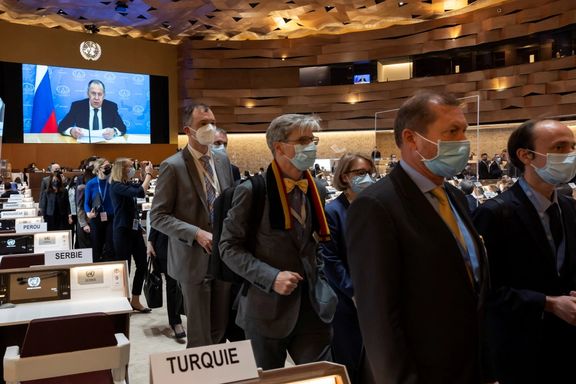Ukraine Crisis Casts Hazy Shadow On Iran Nuclear Talks

Separating non-proliferation from other issues has been a core assumption for 11 months of talks in Vienna aimed at reviving the 2015 Iranian nuclear deal.

Separating non-proliferation from other issues has been a core assumption for 11 months of talks in Vienna aimed at reviving the 2015 Iranian nuclear deal.
That may be changing. The crisis in Ukraine threatens to impinge on negotiations between Tehran and six world powers – China, France, Germany, Russia, the United Kingdom, and the United States. Exactly how, diplomats are unsure.
Since the Biden administration took office in January 2021, Washington has eased closer to the western European trio (the ‘E3’), while taking part at Vienna only indirectly as the US maintains ‘maximum pressure’ sanctions introduced by President Donald Trump in 2018 on withdrawing from the 2015 deal, the JCPOA (Joint Comprehensive Plan of Action).
There is no obvious fall-out from the Ukraine crisis on the Vienna talks. Mikhail Ulyanov, Russia’s lead negotiator, has continued his generally optimistic videos and pictures on Twitter showing his meetings with the US and the E3.
But there is a general wariness. "There's a good chance that a crisis of this magnitude will pollute not only the Iranian file, but many others," a French presidential official told Reuters."This is one of the many subjects on which the relationship with Russia is very severely, very significantly changed by the behaviour of President Vladimir Putin."
Iran’s Supreme Leader Ali Khamenei Tuesday, in a televised speech, said Ukraine was “another victim” as the “US regime creates crises, lives off of crises and feeds on various crises in the world.” Khamenei emphasised that the “US and western powers could not be trusted.”
Trust, guarantees, interests
One of the biggest challenges in the Vienna talks, which those involved have generally said are nearing their end, is Iran’s search for guarantees, both that the US will not again renege on the JCPOA and that neither the US nor the European powers will restrict Iran’s access to world markets. The US ‘maximum pressure’ sanctions threaten punitive action against third parties buying Iran’s oil or dealing with its financial sector.
Three diplomats close to the talks told Reuters that developments in Ukraine had heightened a sense of urgency in Vienna, to the point that agreement on restoring the JCPOA needed to be reached this week before the atmosphere soured. A senior US State Department official said Friday that Washington still thought Moscow wanted to negotiate JCPOA revival, which the official called a “common interest” of the US and Russia.
But there has also been speculation that Iran might feel its position strengthened by a desire in Washington to avoid a second crisis and to see Iranian oil returning to world markets, given the Ukraine conflict has sent oil above $100 a barrel.
Sanctions
Another complication lies is that Russia, with a renewed JCPOA, would be expected, as in the past, to ship out stocks of Iranian enriched uranium. Tehran now has around 12 times the 208kg limitset by the JCPOA. While US and western European sanctions on Russia remain limited, and far less than sanctions on Iran or Afghanistan, they might increase if the crisis in Ukraine continues.
In the Financial Times Tuesday, Alistair Milne, professor of financial economics at Loughborough university, wrote that the experience of Iran showed that the “curious narrative” of barring Russia from the international Swift bank-messaging system would not lead to “cutting Russian money out of global finance” – and that broader measures, similar to those used against Iran since 2004, would be needed.